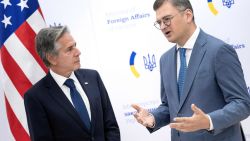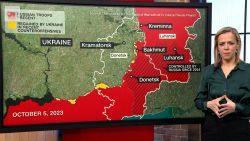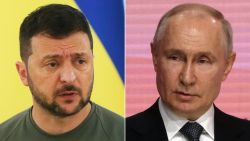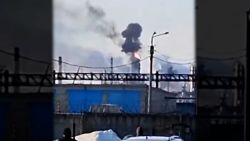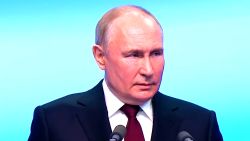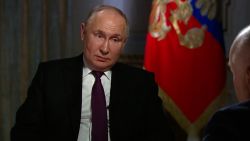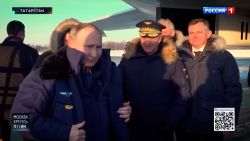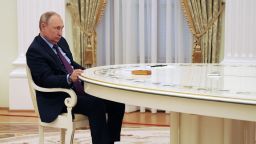Editor’s Note: Dennis Ross, former US envoy to the Middle East, is the William Davidson distinguished fellow at The Washington Institute for Near East Policy. He has decades of experience in Soviet and Middle East policy, working closely with presidents and secretaries of state of both parties. Norman Eisen, former US envoy to the Czech Republic, is a senior fellow at Brookings who served as White House ethics czar. He is the author of two books about Central and Eastern Europe, “The Last Palace” and “Democracy’s Defenders.” The views expressed in this commentary are their own. Read more opinion here.
As Russian leader Vladimir Putin continues his vicious bombardment of Ukraine’s cities and people, it may seem premature to consider what a negotiated solution – an exit strategy – for the invasion might look like.
But as former ambassadors who have worked extensively in the region, we believe finding a way to end the war and stop the bloodshed is necessary and will require negotiation.

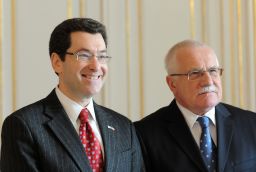
That reality is clearly appreciated by Ukrainian President Volodymyr Zelensky, who has sought genuine negotiations, even asking the Israelis to mediate. Putin has consented to talks, but still seems more interested in decapitating the Ukrainian government than in negotiating with it. Nonetheless, it is not too early to think about what the contours of an eventual negotiated outcome could be.
Of course, the viability of any solution will depend on the course of the war in the days and weeks ahead. As of this writing, indications are the Putin-led effort is still hellbent on toppling the democratically elected government in Kyiv and replacing it with a Kremlin-friendly puppet regime whose strings can be pulled from Moscow.
With missiles shattering buildings and killing civilians in Kharkiv, Mariupol and Kyiv, and Russia’s foreign minister continuing to warn of further escalation, there is little reason for hope in an immediate reduction in hostilities.
But given the devastating effects of the West’s economic countermeasures, which accelerate by the day, and the costs the Ukrainians have inflicted on the Russian military, Putin may well need to look for a way out if the Ukrainians are able to hold on for the next few weeks. Indeed, over that time, the financial pressures, Russian fatalities and domestic disturbances may become so painful Putin will seek an exit path.
In that scenario, any serious steps toward a negotiated solution would still be some distance away, and would be heavily shaped by the invasion’s outcome. If the war fails to deliver Russia a decisive victory, Ukraine may come to the negotiating table with greater advantages.
Indeed, even if the war and Ukrainian resistance drag on for longer, indefinite Russian occupation or a frozen conflict throughout the country are not sustainable paths forward for the Russians or the Ukrainians. Similarly, the Russian economy will likely not survive under the perpetual weight of current and future sanctions.
Something must give.
The first round of talks between the two sides produced little beyond a tentative plan for further negotiations, the second round of which is set for Thursday in Belarus. We have little hope any real progress will be made; Putin seems clearly not ready for it and probably believes if he cannot remove the regime, he needs to intensify the pain to force concessions.
Still, the two sides are talking. Sooner or later, if a deal is to be reached, concessions will need to come from both sides. We take no pleasure in articulating that reality given the heroic conduct of Ukraine and the abominable behavior of Putin’s Russia, but it is a fact of every negotiation.
What might those concessions be? On the Ukrainian side, Zelensky probably already understands he will need to promise Ukraine will not join NATO. This is at the core of Putin’s supposed reasoning for the invasion, and he is unlikely to back down from his central demand.
No doubt, Putin will press for demilitarization in Ukraine, and it will be a non-starter for the Ukrainians. But they might well be willing to say once a peace is clearly established, they will accept limitations on the amount and types of weapons they will maintain, and will also agree not to have foreign forces based in Ukraine. Hedges should be built in if there is an external threat to Ukraine.
Perhaps most difficult to swallow for Kyiv: Crimea is for all intents and purposes destined to remain under Russia’s dominion, and Luhansk and Donetsk will likely be granted significant autonomy within the Ukrainian system. That, of course, would be consistent with the Minsk II plan, which provided for decentralization and local self-government for the regions.
Putin, whose obsession with protecting Russian-speakers from the alleged predations of the Ukrainian state is central to his grievances, will resist surrendering the territorial foothold Russian-backed separatists have helped establish for him in those places over the past eight years.
All that being said, the Ukrainian government and people will not concede too much after having so gallantly withstood Putin’s brazen attacks on citizens and nonmilitary infrastructure. As noted above, Ukraine will not demilitarize, as the Kremlin has demanded. And if we are to understand Putin’s nonsensical justifications correctly, Ukraine will not undergo “denazification” by ousting its own democratically-elected government led by a president who happens to be Jewish.
For all it will sacrifice, Ukraine will expect commensurate concessions from Russia. Paramount among them will be a complete withdrawal of Russian troops from Ukraine. The withdrawal will need to be accompanied by a drastic reduction of Russian forces away from Ukraine’s borders, including in eastern Ukraine, Belarus and the Black Sea. The Ukrainian government and people cannot be expected to rebuild and return to their peacetime lives with Russian boots, tanks and warships hovering near Ukraine’s borders.
These de-escalatory moves would be tied to the phased lifting of sanctions by countries around the world; the United States, United Kingdom and European Union nations being primary among them. Russian compliance with the deal would need to be closely monitored, with the possibility remaining any phased-out sanctions could be reinstated upon a Russian reneging.
While the Russian invasion continues, what should the rest of the world do? First and foremost, Ukraine’s allies should keep the pipeline of resupply open. The thruway for arms, medical supplies and other crucial wartime necessities should not be closed until Russia has proved it negotiated in good faith and intends to hew to the terms of whatever deal emerges.
We strongly agree with President Joe Biden that a no-fly zone should not be imposed over Ukraine and US and NATO forces should not be stationed there. Simply put, you do not back a nuclear superpower into a corner.
It does not matter that the Russian president ultimately trapped himself with his own miscalculations. His nuclear saber-rattling reflects not his strength but his weakness. We do not want to create a situation that leaves him no choice but to escalate, potentially setting in motion a chain of events taking on a catastrophic momentum of its own.
Get our free weekly newsletter
Some analysts and commentators have mapped out scenarios in which further negotiations never happen, and they could be right. Putin might prove successful in ousting Zelensky and his administration. Ironically, if he does, it will come at great cost to his forces, and the puppet regime he imposes will also be sanctioned heavily, making Putin responsible for another potential economic basket case to go along with the one he is engineering in his own country.
Alternatively, the cost of the war in Russian lives and the severe economic downturn Russia will suffer could combine to spur Russian protests and threaten Putin’s hold on power. Either of these outcomes are certainly possible.
But if the Ukrainians can resist and hold out long enough, we suspect the war over the coming weeks and its associated agonies – human, economic, political and social – may well push both sides to additional negotiations. If that happens, neither side will get everything it wants. The morality is black and white here, but diplomacy seldom is.
The concessions that come with negotiations are often painful. But our experience has taught us they are infinitely preferable to the indefinite continuation of hostilities, and even when conflicts are driven by an irrational actor like Putin, the logic of diplomacy can take hold. We pray that is the case here.


